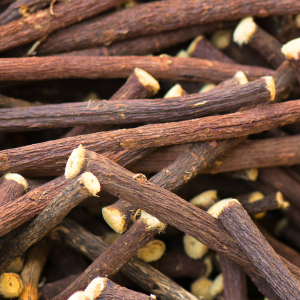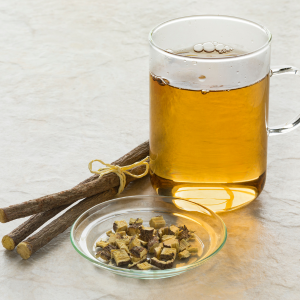What is Licorice Root, How Does It Help with COVID-19, and What Are the Mechanisms Behind Its Effectiveness?
Introduction to Licorice Root - Gan Cao
 Licorice root, known as Gan Cao in Traditional Chinese Medicine (TCM), has been used for thousands of years to treat a wide range of ailments, from digestive issues to respiratory conditions. In recent times, licorice has gained attention for its potential role in combating COVID-19. As the search for effective natural remedies continues, licorice root emerges as a promising herbal option for supporting the immune system and managing symptoms associated with viral infections. This article will explore how licorice root can help with COVID-19, the mechanisms behind its effectiveness, and the latest research on its impact.
Licorice root, known as Gan Cao in Traditional Chinese Medicine (TCM), has been used for thousands of years to treat a wide range of ailments, from digestive issues to respiratory conditions. In recent times, licorice has gained attention for its potential role in combating COVID-19. As the search for effective natural remedies continues, licorice root emerges as a promising herbal option for supporting the immune system and managing symptoms associated with viral infections. This article will explore how licorice root can help with COVID-19, the mechanisms behind its effectiveness, and the latest research on its impact.
Traditionally, licorice has been valued for its ability to soothe the throat, reduce inflammation, and enhance the effects of other herbs. In modern herbal medicine, licorice continues to be a key ingredient in formulas designed to support respiratory health, improve immune function, and manage stress. With its rich history and proven benefits, licorice root is a natural choice for those looking to bolster their defenses during times of illness, including the current pandemic.
What is Licorice Root?
Licorice root (Glycyrrhiza glabra) holds a central place in TCM and Western herbalism for its wide range of therapeutic effects. Known as a harmonizer, licorice is often used in herbal formulations to balance the effects of other ingredients and enhance overall effectiveness. The root is packed with active compounds such as glycyrrhizin, flavonoids, and polysaccharides, each contributing to its health benefits.
- Glycyrrhizin: This is the primary active compound in licorice and is responsible for its anti-inflammatory and antiviral effects. Glycyrrhizin has been shown to inhibit the replication of viruses, including coronaviruses, making licorice a promising herb for supporting respiratory health during viral infections.
- Flavonoids: These antioxidant compounds help protect the body from oxidative stress and have anti-inflammatory properties, which can be beneficial in managing the inflammatory response triggered by COVID-19.
- Polysaccharides: Known for their immune-boosting properties, polysaccharides in licorice root enhance the activity of white blood cells and support the body's natural defenses against infections.
Licorice Root in Traditional Chinese Medicine (TCM)
In TCM, licorice root is known for its ability to harmonize herbal formulas, making it a staple in many prescriptions. It is also used to strengthen Qi, the body's vital energy, and to alleviate symptoms such as coughing, sore throat, and digestive discomfort. Licorice root is considered a tonic herb, which means it helps to balance and restore overall health, making it a valuable ally in both acute and chronic conditions.
How Does Licorice Root Help with COVID-19?
Antiviral Properties
Licorice root has demonstrated antiviral properties in numerous studies, particularly against viruses that affect the respiratory system. Glycyrrhizin, the primary active compound, has been shown to inhibit viral replication and prevent viruses from entering cells. This mechanism is particularly relevant for COVID-19, as limiting the virus's ability to replicate can reduce the severity of the infection and its spread within the body.
Immune System Support
Licorice root helps boost the immune system by enhancing the activity of immune cells such as macrophages and T cells. Macrophages are responsible for engulfing and destroying pathogens, while T cells help coordinate the immune response and attack infected cells. By supporting the function of these critical immune cells, licorice root helps the body respond more effectively to viral infections like COVID-19.
Anti-Inflammatory Effects
COVID-19 can trigger a severe inflammatory response in the body, leading to complications such as cytokine storms. Licorice root's anti-inflammatory properties help regulate the immune response and reduce inflammation. By modulating the production of inflammatory cytokines, licorice may help prevent the excessive immune response that contributes to severe COVID-19 symptoms.
The Mechanisms Behind Licorice Root's Effectiveness
- Glycyrrhizin: Glycyrrhizin is the most studied compound in licorice root and has been shown to inhibit the replication of several viruses, including coronaviruses. It works by blocking viral entry into cells and reducing the ability of the virus to multiply. Additionally, glycyrrhizin has anti-inflammatory properties that help control the body's immune response, reducing the risk of complications such as cytokine storms.
- Flavonoids: Licorice root contains a variety of flavonoids, which are potent antioxidants. These compounds help neutralize free radicals and reduce oxidative stress, which can damage cells and tissues during a viral infection. By protecting the body from oxidative damage, flavonoids in licorice root support overall health and enhance the body's ability to recover from illness.
- Polysaccharides: Polysaccharides in licorice root have immune-modulating effects, enhancing the activity of immune cells and increasing the body's resilience to infections. These compounds also help balance the immune response, ensuring that the body can effectively fight off viruses without triggering excessive inflammation.
 Research on Licorice Root and COVID-19
Research on Licorice Root and COVID-19
While specific research on licorice root and COVID-19 is still emerging, existing studies on licorice's antiviral and immune-boosting properties provide a strong foundation for its potential use in managing COVID-19 symptoms. A study published in the journal Viruses found that glycyrrhizin inhibited the replication of SARS-CoV, a coronavirus closely related to SARS-CoV-2, the virus responsible for COVID-19. Other studies have highlighted licorice's ability to reduce inflammation and support immune function, making it a valuable herb for respiratory infections.
In a review published in The Journal of Ethnopharmacology, researchers noted that licorice root has broad-spectrum antiviral properties and could be beneficial in viral pandemics. However, more clinical trials are needed to confirm its specific effects on COVID-19.
How to Use Licorice Root for COVID-19 Support
 Licorice Root Tea
Licorice Root Tea
One of the simplest ways to use licorice root is by making a tea. Steep 1-2 teaspoons of dried licorice root in hot water for 10-15 minutes. Drink this tea daily to support your immune system and respiratory health.
Licorice Root Decoction
In TCM, licorice root is often used in decoctions, which are concentrated herbal teas made by simmering the root for an extended period. To make a licorice root decoction, simmer 20-30 grams of dried licorice root in 4-5 cups of water for 30-45 minutes. Strain and drink 1-2 cups daily for immune support.
Precautions and Considerations
While licorice root is generally safe for most people, it is important to consult with a healthcare provider before using it, especially if you have high blood pressure, are pregnant, or are taking medications. Glycyrrhizin can cause side effects such as increased blood pressure and potassium imbalances if taken in large amounts over an extended period. It's also important to use high-quality licorice root products to ensure their effectiveness.
Final Thoughts
Licorice root is a powerful herb with a long history of use in both TCM and Western herbalism. Its antiviral, anti-inflammatory, and immune-boosting properties make it a valuable option for supporting the body during viral infections like COVID-19. While more research is needed to confirm its specific effects on COVID-19, existing studies suggest that licorice root can play an important role in enhancing immune function and reducing the severity of respiratory infections. Whether used as a tea, decoction, or supplement, licorice root offers a natural way to support your health during these challenging times.
References:
https://www.ncbi.nlm.nih.gov/pmc/articles/PMC8227143/
https://www.ncbi.nlm.nih.gov/pmc/articles/PMC8066091/
https://www.news-medical.net/news/20221019/Licorice-root-extract-shows-potential-as-a-COVID-19-treatment.aspx
https://www.sciencedirect.com/science/article/pii/S2667031321000257
https://www.sciencedirect.com/science/article/pii/S2090123221002307
https://www.researchgate.net/publication/352238732_Can_Antiviral_Activity_of_Licorice_Help_Fight_COVID-19_Infection
https://encyclopedia.pub/entry/16774
https://www.ifm.org/news-insights/functional-medicine-approach-covid-19-additional-research-nutraceuticals-botanicals/

